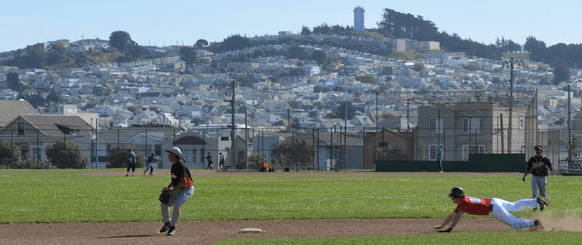For Mexico’s Maya people, baseball, or bax’abola, a way of life
Pitcher Levi Austin Sheats, Club Yucatán’s only non-Latino player, slides into second during a recent game in San Francisco. (Photo by Jonah Harris.)
In Mexico, the Mayas are a people apart.
Half a millennium since Spanish conquistadors set foot in Mesoamerica, their numbers stand in the millions and they remain racially, linguistically and culturally distinct from their non-indigenous countrymen. While most Mexicans are bursting with national pride, some Mayas identify as Yucatecos first — the greatest concentration of Maya are in the Mexican state of Yucatán — and Mexicans second.
And while soccer is practically religion across Mexico, for Yucatec Mayas, baseball gets equal devotion.
Baseball is so popular among Yucatec Mayas that it has become a point of pride and an integral part of what it means to be Maya — right up there with poc-chuc (traditional grilled pork) and jarana yucateca (traditional dance).
In the United States, with a growing Maya immigrant population, baseball can provide a way to stay connected and display cultural pride.
“It is almost like an underground movement,” said Alberto Pérez, director of Asociación MAYAB, a Bay Area Yucatec Maya organization.
Today, a growing but untold number of Yucateco baseball teams are scattered across the state of California. There are even entire leagues whose rosters are mostly made up of Yucatecos.
The sport came to the Yucatán from baseball-mad Cuba, a mere 128 miles away. Mérida, the capital of Yucatán, had more cultural and political exchange with Cuba than with Mexico City, explains Pérez.
Today, “they say a Sunday in Oxkutzcab without baseball is not a Sunday,” said Alberto Gómez, a 42-year-old Yucateco who once played there professionally
Oxkutzcab is a municipality in Yucatán.
In Mexico, Yucateco baseball teams often serve as ambassadors of their small town. A rural, indigenous village with more Maya than Spanish speakers isn’t likely to have a tourism board like many other Mexican cities do, but there’s a good chance it will have a baseball team to act as the community’s unofficial booster club.
Yucatán ball fields are like town squares, with community gatherings often revolving around the game.
“Many people in Yucatán go every Sunday to the field to be with friends and share the experience,” Gómez said. Grabbing the entire family, getting some grilled meat and beer, and heading off to the local ball field is a typical Sunday. “It’s just like an American picnic.”
There are big teams. The Yucatán Leones play in the highest rung of Mexican professional baseball and have a 13,600-seat stadium. But that’s an exception. Attending a Yucateco baseball game is usually an intimate affair, says Gaspar Chi, a Yucateco immigrant to the Bay Area who founded a baseball team here. Many fans who attend games in Yucatán are family members and neighbors who have lived together for generations.
As a result, team loyalties run deep. When teams from the Yucatán municipalities of Cenotillo and Homún play each other, locals support their players and follow the action as avidly as an American football fan would the NFL. Yucatecos still discuss a remarkable game played in Mérida in 1960, when a team from the tiny municipality of Kopté and a team from the village of Suma de Hidalgo took a tie ballgame into 18 innings.
With only one out needed for a win in the bottom of the 18th, Kopté’s pitcher threw an errant pickoff throw, allowing two runners to score and giving Hidalgo the win, “in a blink of an eye.”
For many Maya immigrants in the U.S., baseball also offers relief from the stress of a long workday. Freddy Cetina, a Bay Area player from the Yucatán, says he plays ball to “relax and have fun, to be together with my teammates, my people.”
Nevertheless, Yucatec baseball is notoriously rough and physical. Barreling into the second baseman to break up a double play? Knocking down a runner trying to touch home? It’s just another Sunday on a Yucatec baseball diamond
“Yucatec baseball is very aggressive. Both verbally and physically,” Chi said. “They need to be disciplined. They need to be able to attack the ball.”
Chi has managed Club Yucatán for 12 years. The team is an ensemble cast, some as young as 20, others much older, but they are all joined by a profound love of bax’abola (bash-ah-bohl-ah), as baseball is called in Maya.
They can use their shared culture to their advantage on the field: calling pitches and other moves in Maaya t’aan, their native-tongue.
“Sometimes we will say, ‘run’ or ‘steal the base!’ in Maya, instead of using signals so the other team doesn’t hear,” Gómez said. “White people who play us — they have no idea what is going on.”
Chi is proud of being a mentor, and sees baseball as a way to unite the local Yucatec community and pass on valuable skills to its members. He makes an effort to speak to his young players in Maya, for example, “to teach them to value themselves as Mayas.”
At a recent Sunday game in San Francisco, a player’s wife brought in a steaming tub of tamales for the team, she balanced the heavy container atop her head, a touch of Mayan tradition among American surroundings.
